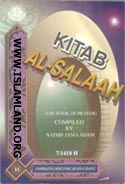Kitab Al-Salaah (The book of Prayer)

The
Witr (Odd Number) Prayer
The "Witr" (Odd Number Prayer) is a voluntary prayer traditionally
practiced by the Prophet (peace be upon him) regularly whether he was
present at his home place as a resident, or was on a journey. Such was
the importance attached to this prayer by the Prophet (peace be upon
him), that some Muslim jurists and scholars are of the opinion that it
is a necessary prayer. The Prophet (peace be upon him) exhorting the
Ummah (Muslim Nation) to the importance of the Witr prayer says:
“Allah (subhanahu wa ta'ala) is One and loves Witr, therefore O people
who believe in the Qur'an perform Witr prayers!” (Reported by
Imams Dawood and Tirmidhi).
The
time for the Witr Prayer begins from the end of Isha (Evening) prayer
and continues until the Fajr (Dawn) prayer and is performed as the last
prayer of the night. Preference is given to its performance in the
later part of the night as can be noted from what has been confirmed by
Aisha (may Allah be pleased with her) that: “The Prophet (peace
be upon him) used to offer Witr prayers in all the later part of the
night such that his Witr prayers used to be finished by about dawn”
(Reported by Imam Bukhari).
The
Prophet (peace be upon him) also said: “Make the Witr prayer
your
last prayer of the night” (Reported by Imam Bukhari).
It
is known as Witr (Odd Number) prayer because of its nature, in that, it
is completed in units (rakaats) of odd numbers, thus, 1, 3, 5, 7, 9,
and 11. The minimum number of rakaats in the Witr Prayer is one and the
maximum which the Prophet (peace be upon him) used to perform was
eleven.
However, Muslims largely performed this prayer in three units (rakaats)
which may be performed in either of the following methods:
- The worshipper may perform two rakaats (similar to the Fajr
prayer). In doing so, may go for the short and/or medium passages of
the Holy Qur'an preferably chapter 87 "Sabihisma Rabbikal A'Alaa" -
(Glorify the name of the Lord, Most High) which maybe recited in the
first rakaat, while, chapter 109 "Al- Kafiruun" (The non-believers)
maybe recited in the second rakaat. As usual, the words of witness are
recited at the end of the two rakaats followed by the Tasleem to
conclude these first two rakaats. The person then stands up to perform
a third rakaat on its own. Chapter 112 "Al-lklas" of the Holy Qur'an
maybe recited in this unit. It is the practice to recite a supplication
of obedience to Allah (subhanahu wa ta'ala) known as "Qunuut" in this
last rakaat and if a person wishes to recite this supplication, he may
do so upon resuming standing from the Rukuu position and after
saying: "SAMI'A ALLAHU LIMAN HAMIDA" followed by "RABBANA WA LAKAL
HAMD". The QUNUUT goes as follows: "ALLAHUMMA AHDINII FIMAN HADEYTA,
WA'AFINII FIMAN 'AFEYTA, WATAWALANII FIMAN TAWALEYTA, WABARIKLII FIMA
A'DEYTA, WAQINII SHARA MAA QADHEYTA, FA INNAKA TAQDII WALAA YUQDAA
ALEYK, INNAHU LAA YADDILU MAN WALEYTA WALAA YA'IZU MAN A'ADEYTA,
TABARAKTA RABBANA - WATA'ALEYTA " which means: "O Lord, lead me to
true faith with those You have guided, pardon me with those You have
pardoned, protect me with those You have protected, bless for me what
You have given me, keep me safe from evils. You have ordained. It is
You Who decrees and it is not decreed upon You, no one under Your care
is brought down and no one to whom You show enmity can be exalted, O
Lord, You are the Most Praised, Most Sublime". Or, the person may
recite any of other supplications of obedience (Ounuut) which the
Prophet (peace be upon him) used to say in his prayers. Upon completing
the recitation of this supplication of obedience, the person would say
"ALLAHU AKBAR" and then, proceed to prostration, thereafter, sits up
for the recitation of (At-Tashahud) and concludes the prayer as usual
with the (Tasleem). And thus, is the Witr Prayer done.
- Alternatively, the person may perform the Witr prayer by
praying all the three rakaats continuously without break. After rukuu
in the third rakaat, the person would recite the Qunuut supplication as
discussed above and would then proceed to prostration, then recites At-
Tashahud and concludes the prayer with the Tasleem.
